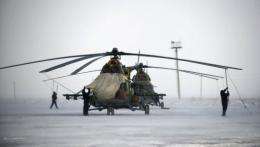Russian craft brings astronauts back to Earth

A Russian Soyuz capsule carrying a US and two Russians astronauts Wednesday parachuted amid hailing winds into a snow-swept Kazakh steppe after a five-month mission to the International Space Station.
"Despite the difficult weather conditions, the landing was standard," news agencies quoted Russian Federal Space Agency chief Anatoly Perminov as saying.
But he added that the three spacemen did not undergo the required medical checks on the spot because of the bitter cold and that their return to mission control in Moscow could be delayed until Wednesday.
"We decided against setting up medical tents in the landing area because we fear for the crew's exposure," Perminov said.
Relying on the breaking power of nothing but a giant red-and-white parachute, the vessel returned from the International Space Station with a crew comprising astronaut Scott Kelly and cosmonauts Alexander Kaleri and Oleg Skripochka.
Kelly is the brother-in-law of US lawmaker Gabrielle Giffords, who was badly wounded when a mentally unstable gunman shot her in the head earlier this year while Kelly was in space.
Giffords' astronaut husband Mark Kelly, who is Scott's twin brother, said last month that he will lead the final mission of the space shuttle Endeavour in April.
The Russian capsule's safe return came just two days after the Russian space agency announced a delay in the next Soyuz mission that was originally scheduled for March 30 due to a technical fault.
News reports said the mission could now take place on either April 7 or April 10, although neither date has been officially confirmed.
"We will announce a new date in the coming days," said Vitaly Lopota, president of Russia's Energia rocket and space corporation.
The Russian setback comes at a pivotal time for international space exploration, with Soyuz capsules providing the only human link to the ISS once the ageing US shuttle programme is retired later this year.
It was particularly embarrassing for Russia because the Soyuz mission was timed to honour the 50th anniversary of the first human space flight by Soviet hero Yury Gagarin.
The delay prompted Russian media rumours of the imminent dismissal of the space chief Perminov, who already lost one top deputy in December following the agency's failure to launch three key global positioning satellites.
Perminov took pains Wednesday to assure reporters that all events linked to the Gagarin anniversary would be conducted as scheduled.
Among them, Russia plans to use a small artificial satellite called Kedr (Cedar) to transmit greetings to Earth in more than a dozen languages using an amateur radio frequency.
Gagarin used Kedr as his call sign when he blasted off into space on April 12, 1961.
Despite this week's setback, the US space agency NASA on Tuesday announced it was renewing its contract to use Soyuz spacecraft for ISS missions until 2016.
(c) 2011 AFP


















